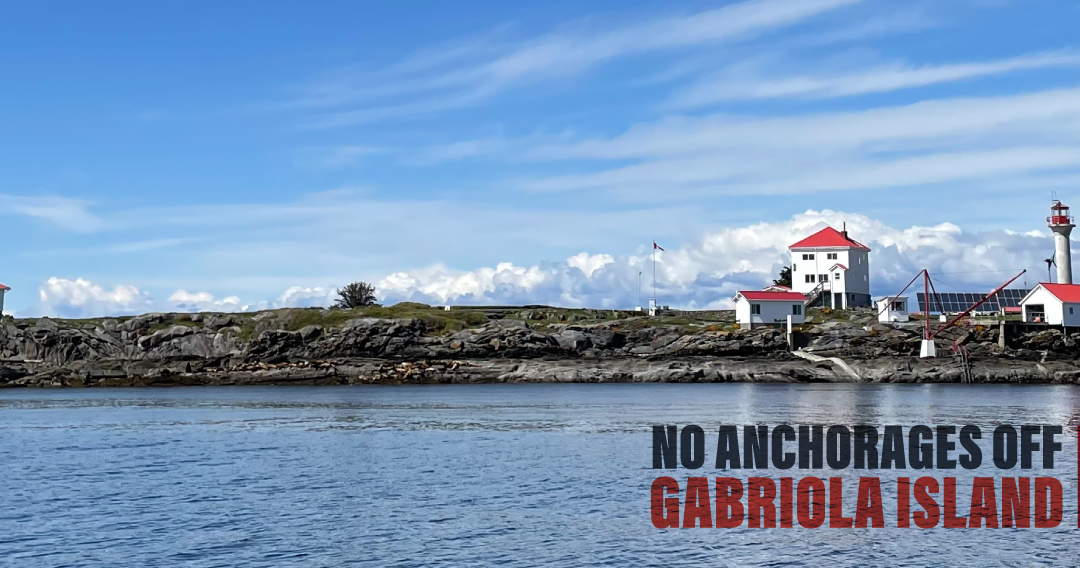The federal government hosted its regular Oceans Protection Plan (OPP) conference in Vancouver on February 22 and 23rd. Canada’s OPP is a broad cross ministry, industry and government initiative aimed at growing Canada’s economy and supporting job growth, protecting coastal environments and advancing reconciliation with indigenous communities.
More recently it has focused on supply chain disruptions. At the conference the federal government confirmed a further 9 year commitment to protect Canada’s coasts and oceans from coast to coast to coast under the OPP.
Of particular interest to GAFA and the South Coast Shipwatch Alliance (SCSWA) was the well attended OPP conference session on Southern Gulf Island anchorages. At the session, Port of Vancouver and senior Transport Canada officials announced plans for the Port of Vancouver to take over management of the 33 anchorages scattered throughout the Southern Gulf Islands. These plans include assigning freighters to the anchorages and enforcement of a new freighter Code of Conduct (the Code) launched in February of 2023. Port officials made clear the Port is not expanding its geographical jurisdiction over the Southern Gulf Island waters, only its ship traffic management powers.
The Code is modelled after the Interim Protocol first established in 2018 by Transport Canada as a direct result of pressure from affected communities to “reduce the impacts of large vessels at anchor outside port authorities in Southern BC”. While the federal government says it plans to make the new Code enforceable, Port officials at the session advised there are no plans for additional personnel or funding to support such enforcement.
The new Code, the first anchorage Code in Canada, addresses freighters operating in the Port as well as in the SGI. It requires each vessel’s Master to acknowledge that they have read, understood, and agree to comply with the Code before they are assigned an anchorage.
However the Code appears to have different environmental expectations for freighters anchored within Port waters and the SGI. For example, it asserts that “the discharge of wash water from exhaust gas cleaning systems (EGCS) commonly known as scrubbers and from fuel combustion machinery (excluding engines in use for propulsion) into the environment is not permitted while a vessel is at anchorage in the Port of Vancouver”. However, vessels “which are assigned an anchorage by the port authority’s Operations Centre outside of port limits, are similarly requested to support this program to the extent that it is practical to do so.
GAFA is deeply concerned. The new Code does not create an enforceable regulatory scheme respecting freighters anchored in SGI waters. To do so it would need to lay out specific actions that must be done or not done and it would need to appoint human resources to monitor compliance. Instead, what we have is an unenforceable document that does nothing to mitigate the environmental impacts associated with freighter anchoring in SGI waters.
At the conference, Transport Canada and Port officials also announced that changes to federal legislation will allow the Port to exercise these new powers. On March 10 Minister of Transport Omar Alhambra spoke in parliament about changes to the Canada Marine Act proposed under Bill C-33, the Strengthening the Port System and Railway Safety in Canada Act. The Minister commented that proposed changes will “expand ports’ abilities to govern and manage traffic, including managing vessel traffic and anchorage use, often a source of concern to coastal communities.” He also noted that proposed changes will create more opportunities for port authorities to work together with indigenous groups and local communities to improve responsiveness and transparency in port management of economic, environmental and social issues.
It appears to GAFA that there is no thought being given as to why freighters are anchored in the Southern Gulf Island waters at all – an area that is under consideration as a national marine conservation reserve. There are no new powers or actions planned by the federal government to assess the environmental impacts of increased freighter anchoring activity GAFA has documented in the SGI, including the 5 anchorages off Pender Island located in waters the same federal government has designated as critical Southern Resident Killer Whale habitat. While the Minister of Transport says climate change risk is a concern in his Bill C33 remarks, there are no initiatives to address increased fire risks associated with freighters taking up anchorages in an era of climate change where forest fires are increasingly common. There are limited fire fighting resources in the SGI. The increasingly dry, windy conditions being experienced in our weakened forest ecosystems create significant risk for fire. Freighters engaging in on-deck maintenance activities involving gas powered machines throughout the summer, which is acceptable in the new Code with permission from the Port’s Operation Centre, contribute to this risk.
At the OPP anchorage session, GAFA member Heather Northrup asked Transport Canada if there were plans for any environmental impact assessments or other measures to protect the Southern Gulf Islands marine environment with the increase in freighter activity. She was advised that there are no such plans. Peter Holmes, head of The Cowichan Bay Ship Watch Society asked if the Port’s long term goal was the eventual elimination of the anchorages. Surprisingly, the Port advised it is an aspirational goal, although you will not find such aspirations noted in any of the Ports public publications.
Bill C-33 is at second reading in the House of Commons. The Code has been published and is in effect. If you, like GAFA members, feel strongly that anchorages do not belong in the Southern Gulf Islands and that attempts to mitigate their environmental impacts with unenforceable documents is wrong, please speak up. Contact Minister Omar Algahbra, at the Ministry of Transport and make your objections known. omar.alghabra@parl.gc.ca
